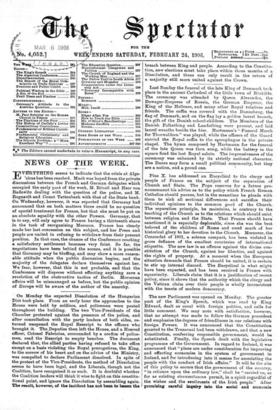Pius X. has addressed an Encyclioal to the clergy and
people of France on the subject of the separation of Church and State. The Pope reserves for a futnre pro- nouncement his advice as to the policy which French Reman Catholics should pursue, but in the meantime he pleads with them to sink all sectional differences and sacrifice their individual opinions to the common good of the Church. The separation principle, he maintains, is contrary to the teaching of the Church as to the relations which should exist between religion and the State. That France should have sanctioned it is especially deplorable, since she was the best beloved of the children of Rome and owed much of her historical glory to her devotion to the Church. Moreover, the Concordat of 1801, a solemn compact, has been violated in gross defiance of the smallest courtesies of international etiquette. The new law is an offence against the divine con- stitution of the Church, against her liberties, and against the rights of property. At a moment when the European situation demands that France should be united, it is certain to stir up internal discord. The Encyclical is what might have been expected, and has been received in France with equanimity. Liberals claim that it is a justification of recent policy, since it shows that the authority which the clergy and the Vatican claim over their people is wholly inconsistent with the tenets of modern democracy.










































